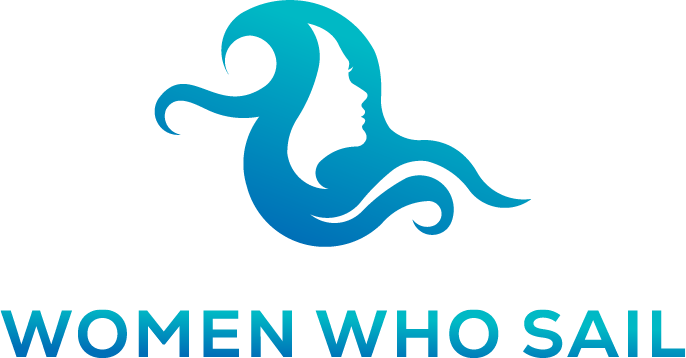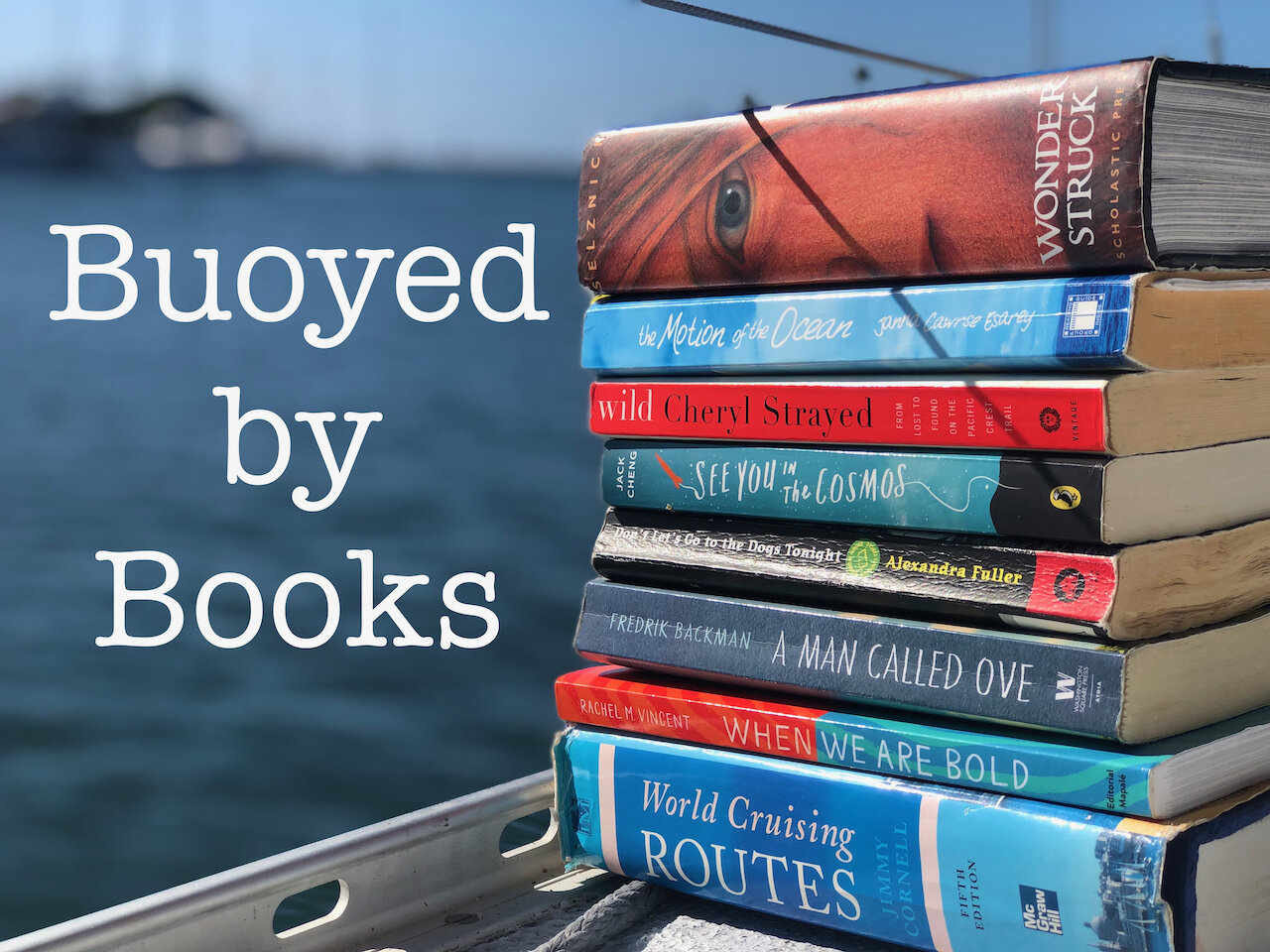READINGS ON CLIMATE ACTIVISM
We can do this—if for no other reason than we must.
“It is always at the moments of greatest darkness that we actually need the brightest light.” -Christiana Figueres
*A Note on Optimism: If thinking about the climate crisis brings you down, I feel you. Take care of yourself as you do this work, and listen to TED Talk Radio Hour’s podcast on Climate Mindset. In it, Christiana Figueres and others talk about the need for “relentless optimism.”
Affiliate links: each sale made through our Bookshop.org links supports independent bookstores! Women Who Sail also receives a small affiliate portion of the sale. You can see all our Bookshop book recs at: bookshop.org/shop/womenwhosail
BY JANNA CAWRSE ESAREY
Books buoy us. They lift us up, give us direction, teach us where to go and how to get there. Sometimes—in the case of mushroom hunting guides, First Aid Afloat, and poetry—they save our lives. Lately, I’ve been looking to books to understand how we might save our planet.
Sailors, attuned to wind, weather, water, and world cultures, have had eyes on the climate crisis for years. Cruising in Micronesia fifteen years ago, my husband and I witnessed the effects of rising waters. Two years ago, sailing in the Arctic with our kids, we witnessed the effects of melting sea ice. Last month, at home in the Pacific Northwest, we witnessed Smokeageddon, one aspect of “global weirding.”
The climate crisis is a right-now reality. Poorer countries—most of which have contributed the least to global warming—are hurt the worst. The debate in the U.S. about climate change is a maddening distraction, like my kids arguing over who forgot the dinghy bung. Who cares; everyone grab a bucket! Or grab a book, dear Women Who Sail—fiction or nonfiction, memoir or poetry—then go out there, armed with knowledge and, above all, optimism, and keep bailing.
NONFICTION
by Greta Thunberg
This precious collection of Thunberg’s speeches—she narrates the audiobook herself—is incredibly inspiring. As a compendium of speeches, however, the book repeats itself. A lot. This can be annoying but it’s also the book’s greatest strength because hearing Our house is on fire! once makes you think, but hearing it over and over makes you act. If the repetition gets too much, though, skip to the last essay. Her sweetly humorous Montreal speech was one of my favorites.
by Hope Jahren
If Thunberg’s calls for panic are not your speed, Jahren offers a more measured approach. She walks us through the many facets of modern life that landed us here—Western culture’s approach to food, water, energy, animals—and suggests multiple ways to change course, from small steps (eat less meat, fly less) to radical ones (don’t eat meat, don’t fly). More prescriptive than Jahren’s memoir, Lab Girl (which I loved), The Story of More presents devastating numbers in quirky ways that make them grok-able, inspiring sober hope and action.
by Peter Senge et al
The Necessary Revolution is a great environmental read for business-minded folks. Not only does Senge describe corporations starting to do business in more sustainable ways, he shows individuals within organizations how to get their teams making environmental progress. While the book is a decade old, it got me thinking in hopeful ways about the many paths toward sustainability.
MEMOIR
by Sarah Broom
You can’t talk about global warming without acknowledging the increasing intensity of tropical cyclones, Hurricane Katrina being the most iconic. Broom, a careful, graceful writer, examines the slow (by poverty), swift (by wind), creeping (by floodwaters), and irreparable (by unauthorized city bulldozer) destruction of her family home in New Orleans East. Painting a lavish family tree, Broom illustrates how African American communities are affected by climate change, pollution, and wholesale neglect in ways unimaginable to White suburbs. Incidentally, I once taught in the same neighborhood Broom describes; that middle school was destroyed by Katrina and never rebuilt.
by Mark O’Connell
Irish author and father, O’Connell, worries about the ill effects global warming will have on his kids’ future, so he travels the world investigating people’s wildly different approaches to the apocalypse—from survival bunker salesmen to Mars colonists, from billionaires buying New Zealand havens to tourists in Chernobyl. The book ends on an oddly hopeful note—young children build resolve like nothing else—but the part that fascinated me most was O’Connell’s analysis of American “preppers” whose combination of toxic masculinity and white supremacy undergirds an ideology of self-reliance.
FICTION
by Octavia E. Butler
Butler’s dystopian Earthseed series imagines California in the 2020s and 30s, ravaged by global warming and economic crises, with a president who promises to “Make America great again”—at which point I had to doublecheck the publication dates: mid 1990s. After reading O’Connell (above), it was an odd and fascinating juxtaposition to encounter Butler’s protagonist Lauren Olamina, a Black teenager prepping to survive the breakdown of society by developing wilderness skills and creating a religious ideology of her own. Lauren is unusual in that she’s a “feeler,” experiencing people’s joy and pain alongside them. Hard to fight for survival when hurting someone else means hurting yourself.
by Amitav Ghosh
I considered tackling Ghosh’s The Great Derangement: Climate Change & the Unthinkable but I needed a novel to feed my soul. The Hungry Tide addresses climate effects upon the natural world, too, but in a digestible story form. I loved the female protagonist, Piya, a marine biologist studying a rare river dolphin in the Bay of Bengal. And, though less enamored with the male lead, I loved the novel's central question: What do we do when civil rights and environmental protection clash?
POETRY, ESSAYS, SHORT STORIES
Edited by John Freeman
So much of what we hear about the climate crisis comes from Western perspectives, but this collection of essays, poetry, and fiction features thinkers and artists across the globe. We quickly realize that climate change has already devastated people’s lives and livelihoods, climates and cultures, and that those who have contributed the least to global warming are, ironically, the most affected by it. The entries vary in length, which makes it a great book to dip in and out of depending on your time and mood. One of my favorite short stories is about a woman who opens, again and again, a box that grants her dearest wish and simultaneously devastates someone else in her life. She knows the box will do this. Yet she keeps opening it.
SAILING CORNER
Taking a break from climate change, one of the most common threads in the WWS forums seeks recommendations for sailing books. As a way of introduction, I thought I’d start with my own book—a love story that happens to take place on a small boat—and build a robust list of legit sailing titles as from here.
by Janna Cawrse Esarey
Here’s what a reader named Brad, a non-sailor, wrote to me about MOTO: “What started as an interest in your adventure turned into a discussion about our lives, our goals, and our marriage. Through your narrative, we opened up a few lost lines of communication and have been talking about B-HAGs [big, hairy, audacious goals] ever since. We also feel like our own experiences with marriage are now much more ‘normal’ than society would leave us to believe. We hope others find it as enlightening as we did.”
janna cawrse esarey
Janna is a sailor, author, and speaker focusing on helping people pursue B-HAGs: big, hairy, audacious goals. She is an Integrated Life Advocate with ThirdPath, an organization that helps folks redesign work and home to make time for life. Janna’s first book, The Motion of the Ocean, is about how she sailed across the Pacific on her honeymoon and is still married. She’s working on a new memoir about how navigating modern parenthood is more perilous than sailing the Arctic with kids (she’s tried, and sort of failed at, both). Janna lives with her husband and two daughters on an island near Seattle where she is also a school bus driver. More at saildogbark.com.











